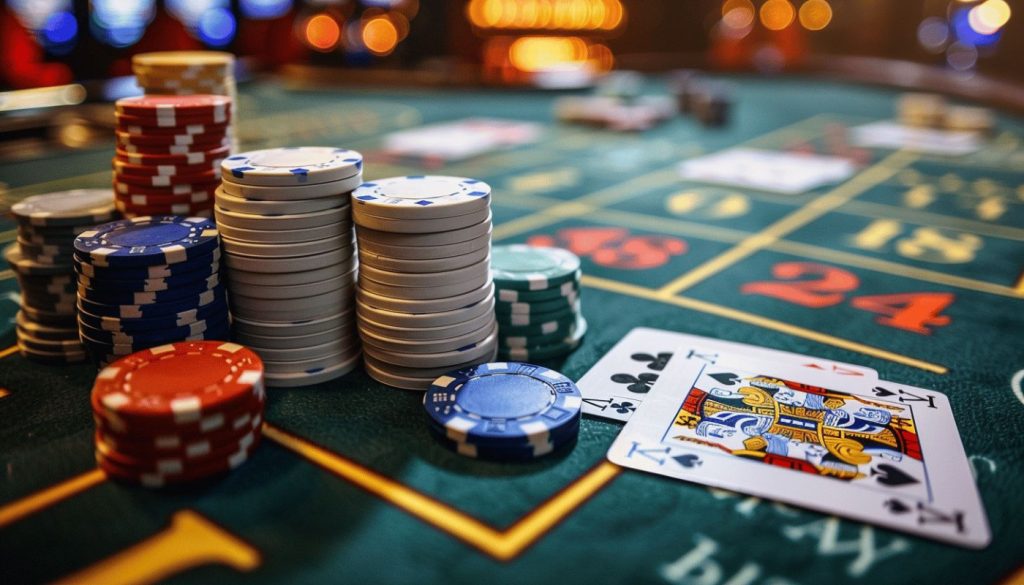The clatter of the chips. The soft rustle of the cards. The hushed anticipation around the table. Baccarat is more than just a game of chance—it’s a high-stakes theater for the human mind. Sure, the rules are simple: you bet on Player, Banker, or Tie. But beneath that elegant surface lies a whirlwind of cognitive biases, emotional triggers, and decision-making puzzles.
Honestly, understanding the psychological aspects of baccarat gameplay isn’t just for pros. It’s for anyone who’s ever felt that gut pull to double down after a loss or questioned a perfectly logical strategy in the heat of the moment. Let’s dive into the fascinating mental dance between you, the cards, and your own brain.
The Allure of the Pattern: Our Brains as Prediction Machines
Human beings are hardwired to seek out patterns. It’s a survival instinct. In the unpredictable environment of a casino, this instinct goes into overdrive. You see five ‘Banker’ wins in a row? Your brain screams, “It’s a trend!”
This is the gambler’s fallacy in full, dazzling effect. It’s the mistaken belief that past random events influence future ones. If a coin lands on heads five times, we feel tails is “due.” In baccarat, this manifests as players meticulously tracking shoe results on paper or in their heads, convinced they can spot a “pattern” they can bet against. The reality is, each hand is an independent event. The deck has no memory.
And then there’s apophenia—the tendency to perceive connections and meaning between unrelated things. That feeling that the card is “meant” to be a nine, or that the dealer’s slight smile indicates a good hand for the Player? That’s your pattern-seeking brain working overtime, creating narratives where none exist.
The Emotional Rollercoaster: Tilt, Superstition, and the Illusion of Control
Going on Tilt
Ever seen a player suddenly start making huge, reckless bets after a bad beat? That’s “tilt.” It’s a poker term, but it’s pure baccarat psychology. Tilt is an emotional state—usually of frustration or desperation—that clouds judgment and leads to poor decision-making. You’re no longer playing the odds; you’re playing to get even, to reclaim what you feel is yours. And the house loves it.
Rituals and Superstitions
From blowing on the cards to sitting in a “lucky” spot, superstitions are a player’s attempt to impose order on chaos. This ties directly into the illusion of control. By performing a ritual, we feel we’re influencing an outcome that is, in truth, completely random. It’s a psychological comfort blanket. It doesn’t change the game, but it can change how you feel playing it—for better or worse.
Cognitive Biases at the Baccarat Table
Our minds take mental shortcuts (heuristics) to make quick decisions. In baccarat, these shortcuts can become costly traps.
| Bias | What It Is | How It Manifests in Baccarat |
| Confirmation Bias | Seeking out information that confirms our existing beliefs. | You believe the Banker bet is lucky, so you remember all the times it won and forget the long streaks of Player wins. |
| Availability Heuristic | Judging the likelihood of an event based on how easily examples come to mind. | You just saw a Tie bet pay out 8-to-1. Its dramatic payoff makes it seem more common than it actually is, tempting you to bet against the steep odds. |
| Anchoring | Relying too heavily on the first piece of information offered. | You start the session with a big win. This “anchor” makes subsequent losses feel smaller, potentially leading you to risk more than you planned. |
Decision-Making Under Uncertainty: Strategy vs. Impulse
Here’s the deal: baccarat is a game with a near-50/50 split between Banker and Player (minus the commission). The mathematically optimal decision-making strategy is straightforward. Yet, we constantly deviate from it. Why?
It often boils down to the conflict between our two brain systems:
- System 1 (Fast, Intuitive): This is your gut. It says, “The Player is on a hot streak, stick with it!” It’s emotional, automatic, and easily swayed by recent events.
- System 2 (Slow, Analytical): This is your logic. It calculates the house edge, remembers the Banker’s slight statistical advantage, and sticks to a pre-determined budget. It requires conscious effort.
In the fast-paced, emotionally charged casino environment, System 1 often overpowers System 2. The key to better baccarat decision-making is to find ways to engage your analytical brain before you ever place a bet.
Mastering Your Mind: A Psychological Game Plan
So, how do you play the mental game? You can’t change the odds, but you can absolutely change your relationship with them.
- Set Ironclad Limits. Decide your loss limit and win goal before you sit down. This is your System 2 making a rule that your impulsive System 1 has to follow. Write it down if you have to.
- Treat the Game as Entertainment, Not an Investment. The money you bring is the cost of that entertainment. This mindset shift alone reduces the emotional sting of loss and prevents desperate chasing.
- Recognize the Signs of Tilt. Are you feeling hot, frustrated, or betting faster? That’s your cue. Stand up. Walk away. Get a coffee. A five-minute break can reset your entire psychological state.
- Embrace the Randomness. Actively remind yourself that each hand is a fresh start. The cards don’t have a memory. The table doesn’t have a personality. This mental practice helps dismantle the gambler’s fallacy.
In the end, the most important hand you’ll play in baccarat isn’t against the Banker or the Player. It’s the one you play with yourself—a delicate balancing act between intuition and logic, emotion and discipline. The real win isn’t just walking away with more chips, but walking away with a clearer understanding of the fascinating, flawed, and utterly human mind making the bets.

